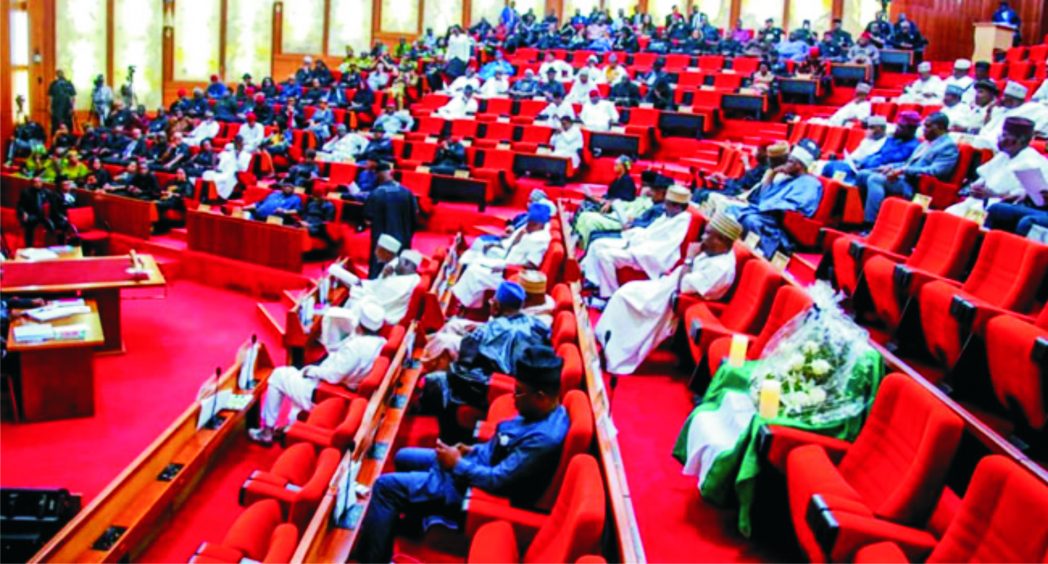Editorial
Senate And Constitution Review

Like every Senate before it since 1999, the Ninth Senate has set up a 56-member committee for the amendment of the 1999 Constitution. The committee, headed by Deputy Senate President, Obarisi Ovie Omo-Agege, may be the Senate’s response to objections and continual whines of the constitution for containing some ambivalence that impede harmony and development of Nigeria.
As the review process starts up, Omo-Agege of the All Progressives Congress (APC, Delta Central) said recommendations of the 2014 National Conference chaired by late former Chief Justice of Nigeria, Idris Kutigi, and the Committee on Restructuring headed by the Kaduna State Governor, Nasir el-Rufai, would be evaluated and used as working documents.
Speaking further, the Deputy Senate President said the alteration of the Sixth Schedule, the establishment of National and State Houses of Assembly Pre-election Matters Tribunal, Governorship Pre-election Matters Tribunal and Presidential Pre-election Matters Tribunal including time limits for the disposal of all pre-election matters before the conduct of the general election would be considered as well.
Also to be examined, according to the committee chairman, are devolution of power, full local government fiscal autonomy, full autonomy of the judiciary, youth inclusiveness in governance, and gender parity, among others.
“In carrying out this national assignment, this committee will, no doubt, consider the alteration of the Sixth Schedule to make provision for new items, the establishment of National and State Houses of Assembly Pre-election Matters Tribunal, Governorship Pre-election Matters Tribunal and Presidential Pre-election Matters Tribunal including time limits for the disposal of all pre-election matters before the conduct of the general election,” Omo-Agege said.
It is reasonable that the Senate has, for once, pledged to study the reports of the 2014 National Constitutional Conference and the el-Rufai Restructuring Committee. There were far-reaching deliberations and resolutions on moving the country forward in those reports. We believe it will be wise to initiate relevant bills based on their recommendations in this constitution review activity.
Indeed, the items contemplated for amendment are what Nigerians have always clamoured for all along in previous constitution modifications. But will anything change with this fresh initiative? Will the outcome be acceptable and assented to by the President? This ritual was performed four times in the Fourth Republic, all of which failed woefully to address the crucial issues undermining the country’s corporate existence.
For instance, there are many recurring issues like local government autonomy, devolution of powers, rotation of power at federal and state levels, full autonomy for state Houses of Assembly, electronic voting, state police, and the like, which had the sanction of majority of Nigerians during previous exercises, but they failed to make it to the amended Constitution. It is for this reason Nigerians have always found fault with the 1999 Constitution.
This has led to the screaming advocacy for the complete rejection of the present document in favour of an autochthonous one. The campaign is based on the opprobrious fact that it is dubious and a product of the military regime of Abdulsalami Abubakar, with the counterfeit claim that it was the creation of the people.
Nigeria is eclectic in ethnicity, culture and religion. Therefore, it should be run with deference for these sensibilities through pristine federalism. If this model works for the United States of America (USA), Canada, India and Australia with diversities as ours, why can’t it work for us?
It is explicit that lack of a home-grown constitution has made nation-building complicated; economic growth and development evasive; and social harmony a sisyphean task. Consequently, ethnicity and religion have become divergent points in the Nigerian state.
It was to prevent chaos that the country’s founding fathers adopted the 1963 Constitution entrenched in true federalism. The four regions at the time: West, North, East and Mid-West were the federating units with their own constitutions. Revenue was not shared at the centre. Rather, every region was a wealth creator; developed at its own pace; had its police, controlled its resources and paid royalties to the federal government.
We need a return to this archetype, not a constitutional amendment. So, the National Assembly should begin a process that will hand down a brand new constitution to Nigeria, which would bring it to self-rediscovery. Having borrowed the presidential system from the United States, we ought to have replicated its constitution. Is it not astonishing that while Nigeria has 68 items in the Exclusive Legislative List, the US has only 12 items in its exclusive list, known as Enumerated Powers?
Today, Nigeria has been transformed into a valley of death, largely because of the notorious activities of terrorist groups, bandits, kidnappers and armed robbers, among others. That is why the nation must undertake urgent political restructuring and enthronement of true federalism through the ongoing constitution amendment exercise.
Editorial
As NDG Ends Season 2

Editorial
Beginning A New Dawn At RSNC

Editorial
Sustaining OBALGA’s Ban On Street Trading

-
Maritime5 days ago
Nigeria To Pilot Regional Fishing Vessels Register In Gulf Of Guinea —Oyetola
-

 Sports5 days ago
Sports5 days agoGombe-Gara Rejects Chelle $130,000 monthly salary
-
Maritime5 days ago
Customs Declares War Against Narcotics Baron At Idiroko Border
-

 Sports5 days ago
Sports5 days agoTEAM RIVERS SET TO WIN 4×400 ” MORROW” …Wins Triple jump Silver
-
Maritime5 days ago
NIMASA,NAF Boost Unmanned Aerial Surveillance For Maritime Security
-

 Sports5 days ago
Sports5 days agoNPFL Drops To 91st In Global League Rankings
-

 Sports5 days ago
Sports5 days agoNIGER DELTA GAMES PANACEA TO YOUTH DEV”
-

 Sports5 days ago
Sports5 days agoNPFL Impose Fines On Kwara United Over Fans Misconduct

